Listen:
Check out all episodes on the My Favorite Mistake main page.
My guest for Episode #297 of the My Favorite Mistake podcast is Norman Wolfe, the Founder and CEO of Quantum Leaders.
Norman's journey as both a successful executive and a trusted coach to countless leaders has been driven by one central question: How can we improve our ability to achieve the results we want? His pursuit of this answer led him to master a wide range of business disciplines—from leadership and strategy to operations and finance—while also deeply exploring human potential, personal growth, and even spirituality.
Norman's mission now is to help others transform their thinking and approach to more effectively achieve their deepest desires.
In this episode, I chat with Norman about how mistakes can spark profound growth and innovation in leadership. Norman shares his favorite mistake story—from his early days as a first-time manager, where a harsh performance review challenged him, to the lessons that fueled his journey toward becoming a top leader at Hewlett-Packard. He explains Wolfe's Law, his formula that highlights the exponential impact of relationships and context on achieving outcomes.
We also dive into the principles of quantum leadership, discussing how a holistic, people-centered approach—blending practical leadership with a touch of spirituality and systems thinking—can transform organizations into dynamic learning ecosystems.
Questions and Topics:
- What is your favorite mistake?
- Did the negative review or your mentors provide specific, actionable feedback for improvement?
- Is the formula you mentioned what you call “Wolfe’s Law”?
- Could you state Wolfe’s Law for us?
- Does your formula imply that relationships are exponentially more important than activity and context?
- How does spirituality fit into your framework—does it fall under context or serve another role?
- How do you assess whether individuals (or teams) are mature enough for increased responsibility?
- What should be eliminated versus managed when dealing with ambiguity and risk?
- From your experience, why is it essential to reframe mistakes as positive learning opportunities?
- Do you believe that making mistakes fosters adaptation and growth?
Scroll down to find:
- Video version of the episode
- How to subscribe
- Quotes
- Full transcript
Find Norman on social media:
Video of the Episode:
Quotes:
Click on an image for a larger view
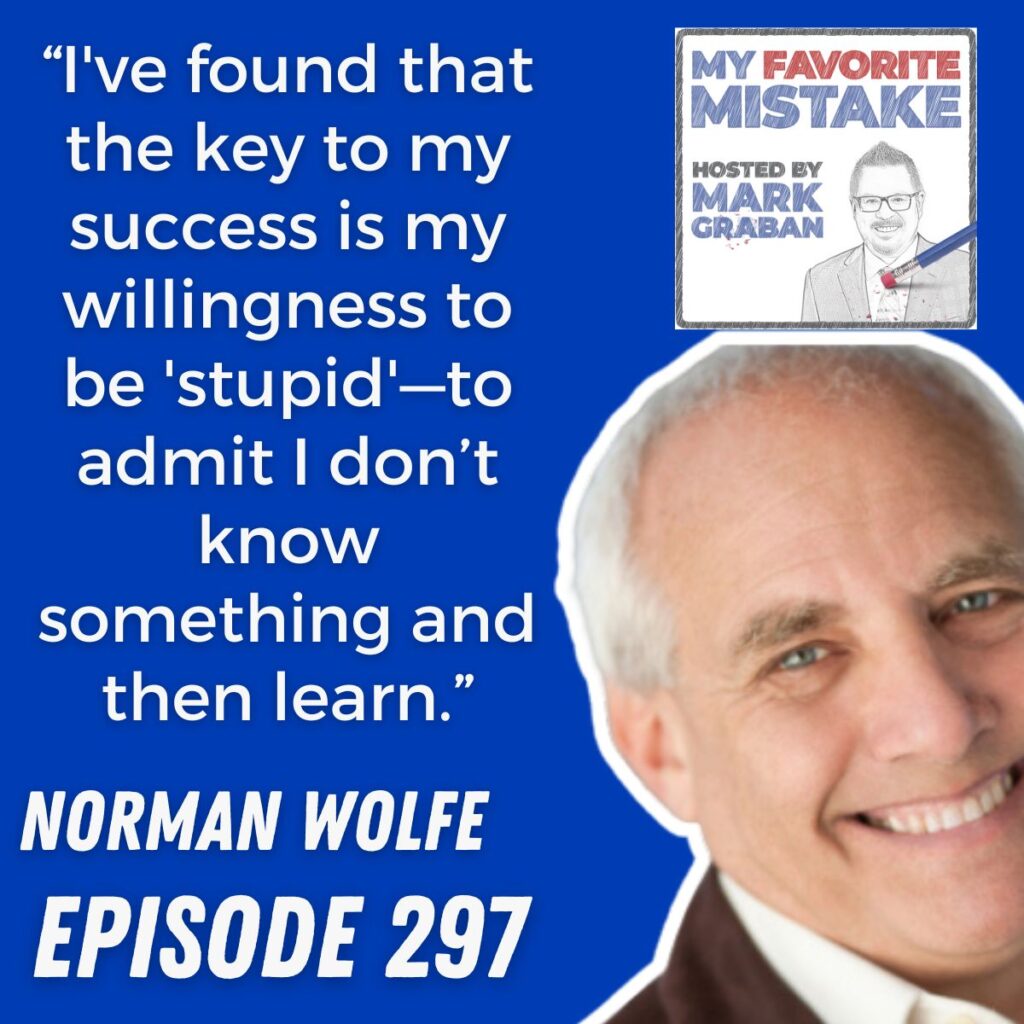
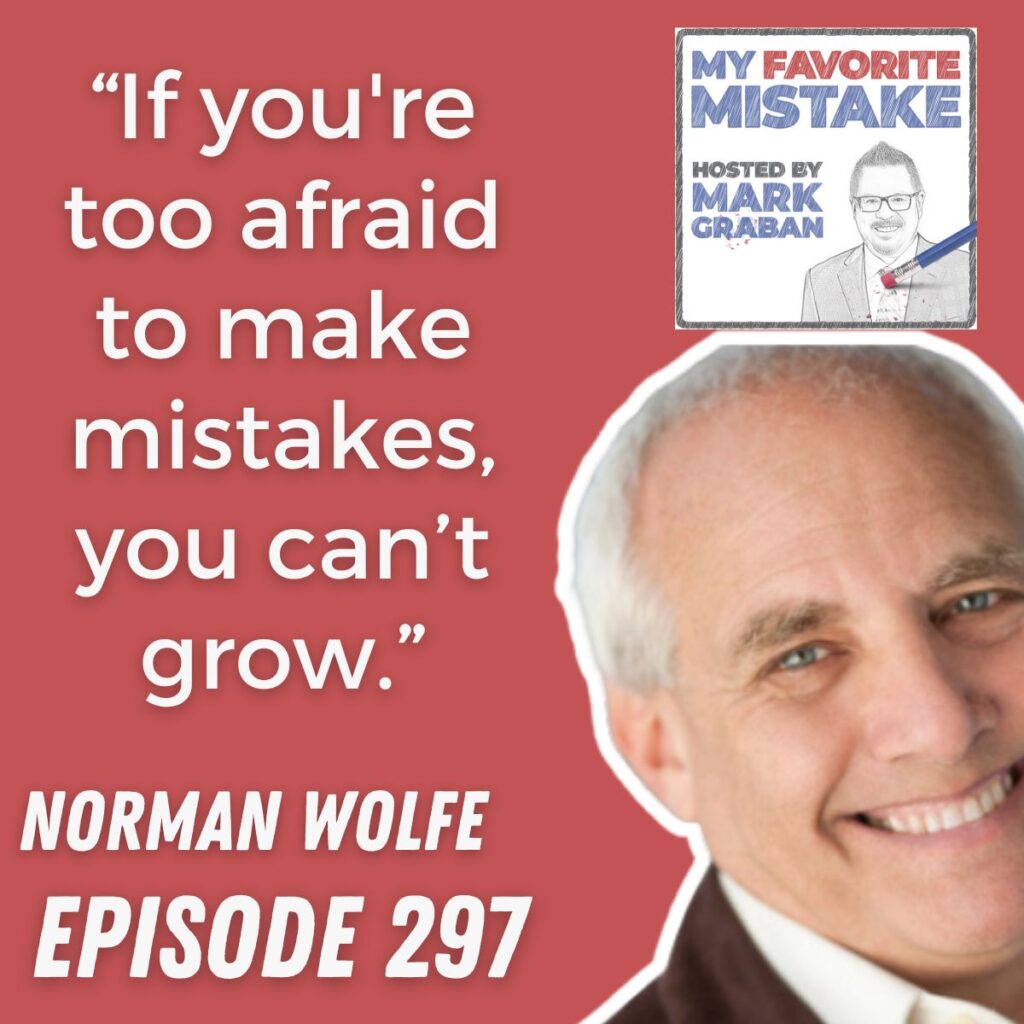
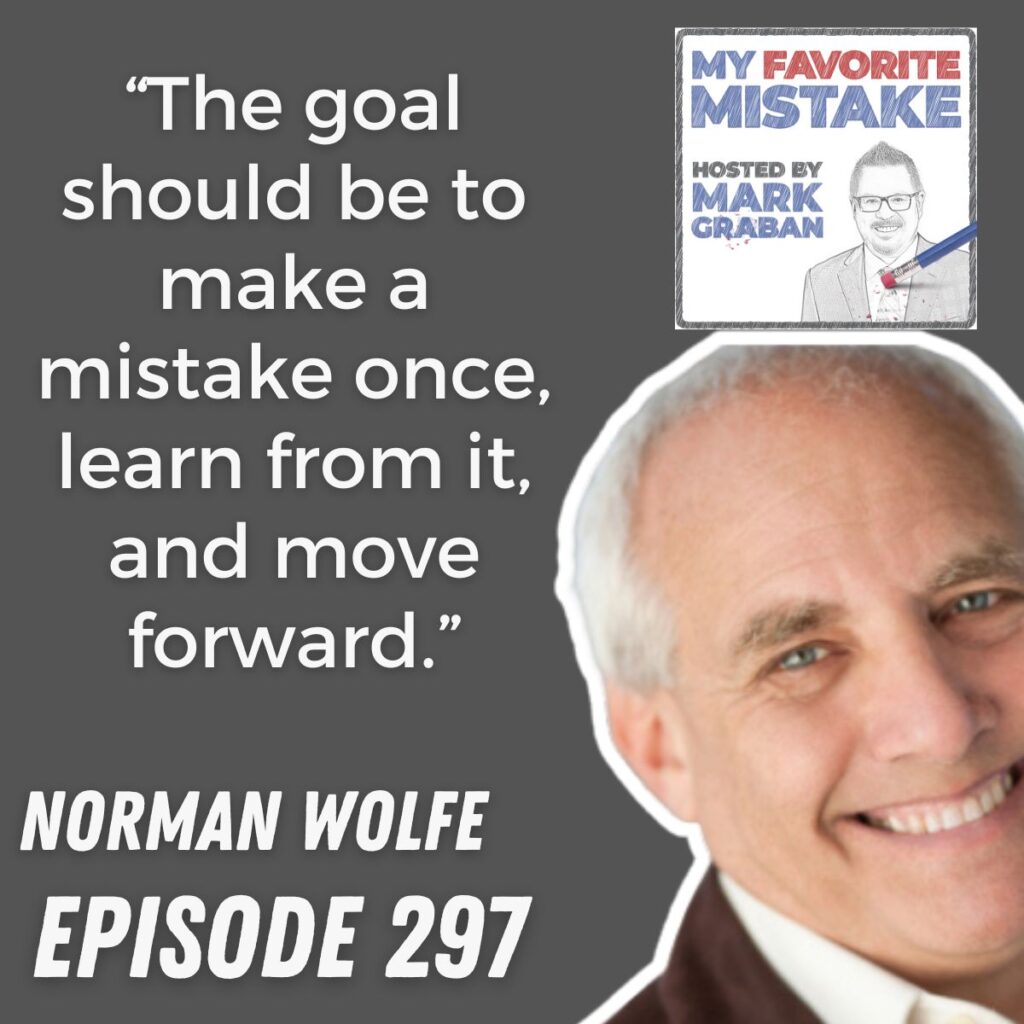
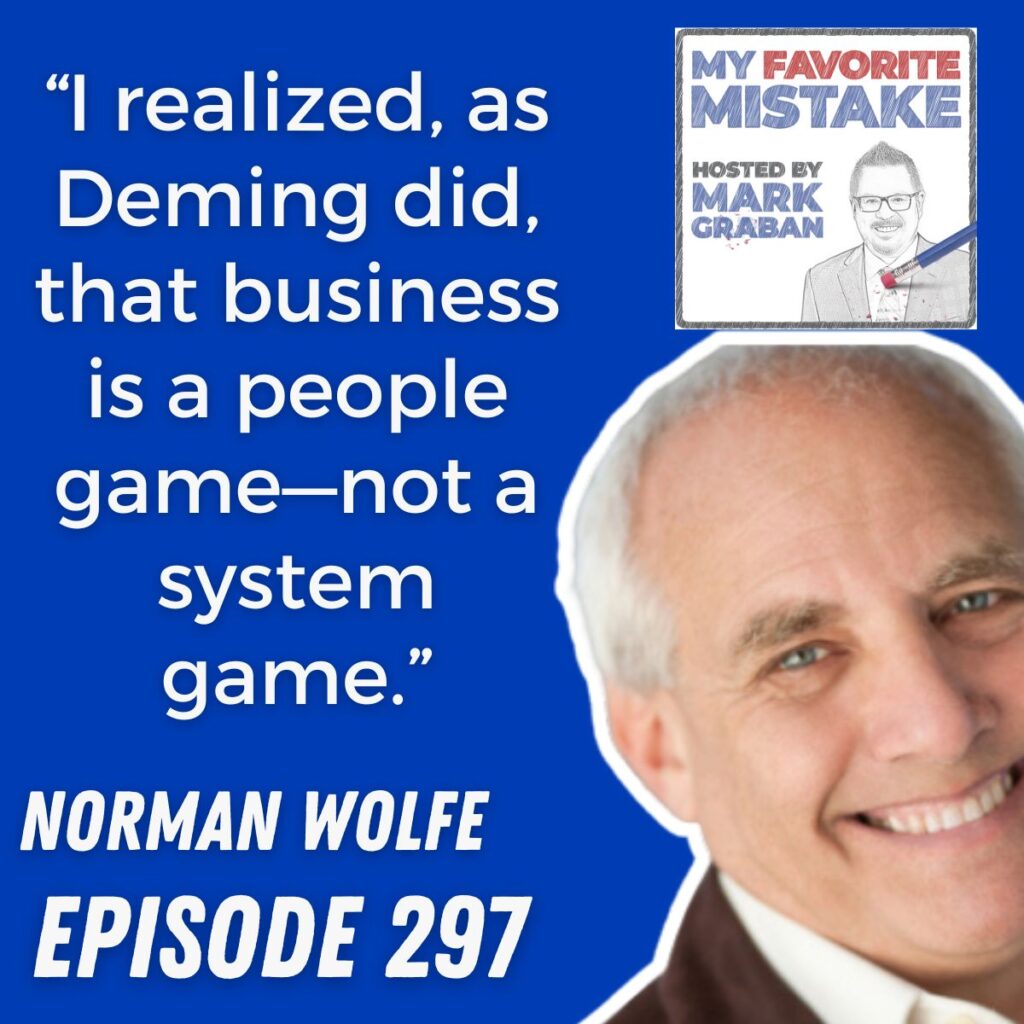
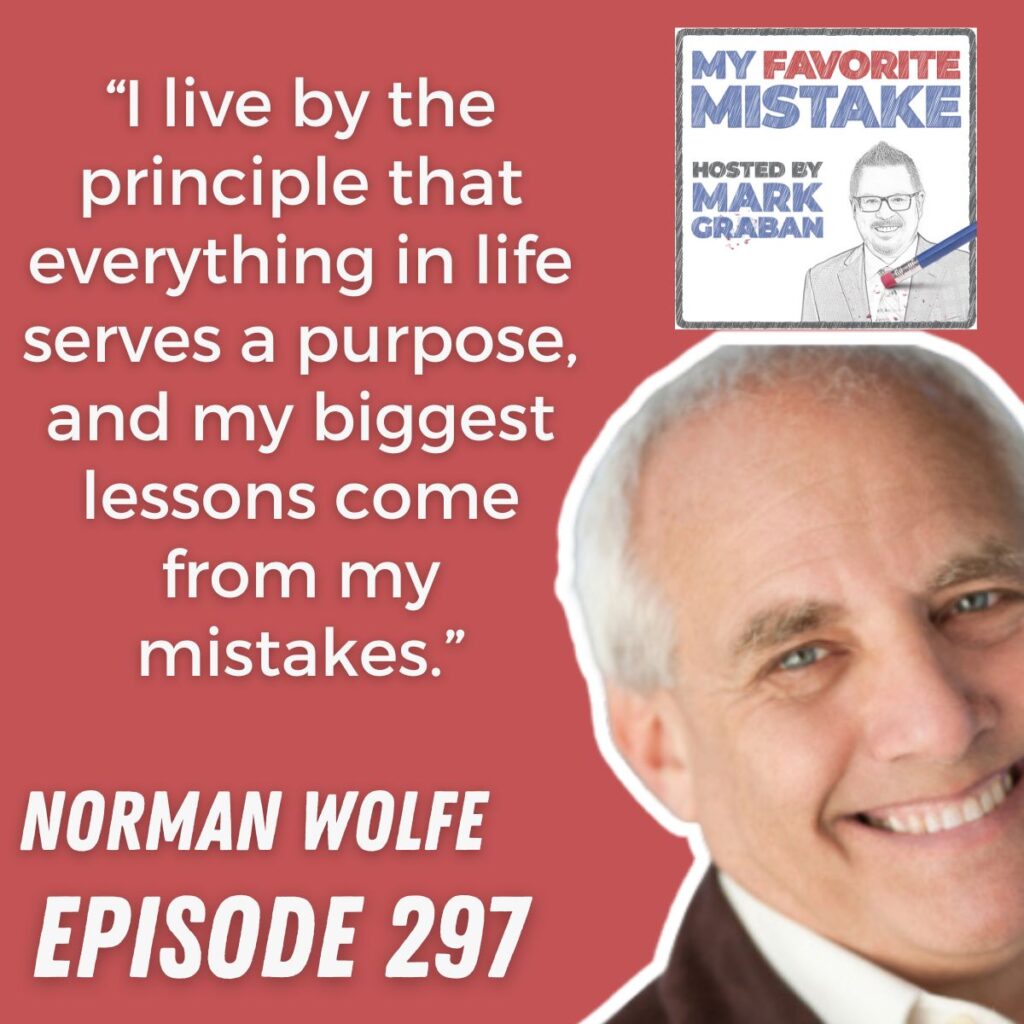
Subscribe, Follow, Support, Rate, and Review!
Please follow, rate, and review via Apple Podcasts, Podchaser, or your favorite app — that helps others find this content, and you'll be sure to get future episodes as they are released weekly. You can also financially support the show through Spotify.
You can now sign up to get new episodes via email, to make sure you don't miss an episode.
This podcast is part of the Lean Communicators network.

Other Ways to Subscribe or Follow — Apps & Email
Automated Transcript (May Contain Mistakes)
Mark Graban:
Hi. Welcome to My Favorite Mistake. I'm your host, Mark Graban. Our guest today is Norman Wolfe. He's the founder and CEO of Quantum Leaders. Norman's journey as both a successful executive and a trusted coach to countless leaders has been driven by one central question: How can we improve our ability to achieve the results we want? His pursuit of answers led him to master a wide range of business disciplines—from leadership and strategy to operations and finance—while also deeply exploring human potential, personal growth, and even spirituality. Now, there's a word that doesn't often come up in that mix. So, Norman, welcome to the podcast.
Norman Wolfe:
How are you? Thank you, Mark. It's a pleasure to be here. I'm really looking forward to our conversation.
Mark Graban:
Yeah, well, likewise. There's a lot to learn from your experience, and one of those first things is lessons learned from mistakes. So, we'll start off with the key question: What would you say is your favorite mistake?
Norman Wolfe:
Wow. It's always hard to pick just one. But I would say that probably the most critical experience I had was very early in my career. It was actually my first management position. I had been a very successful—let's just call it a technical expert. I left university and worked as a systems programmer and system designer for Pratt and Whitney Aircraft in the test-stand data acquisition world. I then got a job with HP and became what they call a regional systems engineer, where I supported all of the other systems engineers and the salespeople in the Western sales region. Primarily because of my skills—both technically and especially with customers—I was offered the opportunity to become a district service manager. I knew nothing about fixing computers.
Mark Graban:
Sure.
Norman Wolfe:
So, it was my first management role, and I just had a very keen sense of working with people. I thought, “Hey, I'd be really good as a manager.” Well, management turned out to be a little bit more difficult than I thought. I remember my first performance review: I had just spent a week in the UK—it was 1976, actually. I remember it because we were there for the hundredth anniversary of the centennial of the United States Bicentennial.
Mark Graban:
Bicentennial.
Norman Wolfe:
Thank you. And I came back really feeling good. I knew I had some challenges, but I was really looking forward to the future. Then I got my performance review, and when I looked at it, I was absolutely shocked. I had been rated unacceptable in every category.
Mark Graban:
Wow.
Norman Wolfe:
Yeah, so I guess I made a lot of mistakes that first year.
Mark Graban:
Yeah.
Norman Wolfe:
I think the biggest mistake was that I didn't really understand what it meant to be a leader. You know, many leaders grow up and move up the ranks of their organization—a salesman becomes a sales manager, or a technician becomes a service manager, or an operations guy moves up to a VP of operations. But I came from the sales organization and moved into managing the service business. I wasn’t the kind of leader who could simply say, “I've been successful; follow me.” Instead, there was a whole set of skills I had to learn. Of course, my first reaction to getting that review was to run back to what I was good at.
Mark Graban:
Yeah.
Norman Wolfe:
I think the greatest lesson I learned, thanks to some wonderful mentors, was to stick with it. I remember the general manager of the region taking me out to lunch and saying, “Norman, I know it’s been a tough year, but we see a lot of positive movement.” Of course, none of that was in my review, but it was good to hear. They said, “You're going to be one of our better leaders.” So I stuck with it. In fact, I eventually became one of the top leaders at HP. That experience definitely brought a huge blow to the ego—as all mistakes do—but it also taught me a lot about what leadership and management are really all about.
Mark Graban:
Well, maybe that gives you a better appreciation or ability to coach leaders who are struggling, because you did have that struggle. Instead of saying, “I've had this success; come follow me,” the struggle led to success. That's a different perspective.
Norman Wolfe:
Absolutely. That negative experience was the foundation that shaped the rest of my life. You mentioned in my introduction that my central focus has always been on creating the outcomes we want. And that's the number one responsibility of any leader. I don't care if you're running a team or a multinational corporation—the goal is to achieve the outcomes we want. Clearly, that early experience became the catalyst for my journey into leadership, motivation, psychology, and even areas like physics and spirituality. It’s all about figuring out how to get more of what we want and less of what we don't.
Mark Graban:
Yeah. I'd love to explore that work you’ve done a little more. One other follow-up question related to your story: Did that negative review or your mentors provide specific, actionable feedback—other than the optimistic, “Hey, we know you have potential; you'll get better”—that helped you know what to work on?
Norman Wolfe:
No, not really. The review pointed out everything I wasn't doing, but it didn't give much guidance. One unfortunate part was that my boss—the regional service manager I reported to—wasn't a very good coach.
Mark Graban:
Yeah.
Norman Wolfe:
I did learn a lot from him, though—not so much in terms of developing people, but in running a business, managing budgets, and forecasting. When it came to working with people and, ultimately, creating outcomes for an organization, it's the people who do it. As leaders, we don't do it; the people do. The challenge is how to get people to do what the organization needs.
Mark Graban:
Yeah.
Norman Wolfe:
So, yeah.
Mark Graban:
And how do we lead them to get there? I love what you said about the leader's number one responsibility being to help people achieve results. That reminds me of the late, great W. Edwards Deming, a quality guru who worked with Japanese companies and later with American organizations. Deming was pretty radical for his time, saying we should abolish the annual performance review in favor of leadership and coaching. He believed that a leader's role is to help people improve and perform, not just to judge them after the fact.
Norman Wolfe:
Yeah, I've been influenced by dozens of wisdom keepers. Deming is certainly one of them. Tom Peters is another, and then there's Greenleaf with servant leadership. The list goes on. I even go back to the work of McGregor, Maslow, and Carl Jung. All that human-centric work influenced me. I realized, as Deming did, that business is a people game—not a system game. In fact, I believe that the statistic showing 70% of companies fail to achieve their strategic objectives is largely because we treat organizations like machines. We try to optimize systems, structures, and processes, but Deming recognized—and so did I—that it's the people who are truly responsible for outcomes.
Mark Graban:
Yeah.
Norman Wolfe:
If we assume that the right structures alone will drive behavior, we miss what really motivates people: a sense that the organization cares for them.
Mark Graban:
Yes.
Norman Wolfe:
That’s why, in our living organization framework, one of the core principles is empowerment. To empower people, you must give them a choice—they must decide that they want to do what the organization needs, rather than being manipulated into it.
Mark Graban:
Yeah.
Norman Wolfe:
Otherwise, all you're doing is applying different forms of manipulation, which doesn't truly motivate people.
Mark Graban:
No. And as Deming often noted, the psychology behind motivation is crucial. What motivates one employee might not work for another. We are not interchangeable cogs in a machine.
Norman Wolfe:
That's right.
Mark Graban:
Tom Peters has been a hero of mine as well. He was a guest in episode 58 of this podcast series. I encourage people to check that out because he emphasizes that it ultimately comes down to people and culture—the mindsets and behaviors that drive us.
Norman Wolfe:
Exactly. And one of the other principles in our living organization framework is the idea of context. I approached creating outcomes from an engineering perspective, recognizing that everything is energy and energy can neither be created nor destroyed. To create an outcome, you transform energy from one form to another. I broke that down into three fields: activity (what we do), relationships (how we interact, which can amplify or dampen our energy), and context (the narrative or operating system that underlies our behavior). When you understand and work with context, it enhances both relationships and activity.
Mark Graban:
Yeah. So is that formula what you refer to as Wolfe's Law?
Norman Wolfe:
Yeah, exactly.
Mark Graban:
Could you state Wolfe's Law for us?
Norman Wolfe:
It goes: Outcome equals activity times relationship squared, all to the power of context. In other words, A × R², raised by C.
Mark Graban:
So if I'm thinking it through, that means relationships are exponentially more important than activity, and context amplifies it even further.
Norman Wolfe:
Yes, that's exactly the point. It’s not a simple sum of activity, relationship, and context—they interact in a much more dynamic way.
Mark Graban:
Yeah. And that’s why it's not just activity plus relationship plus context.
Norman Wolfe:
That's right. If it were, they'd be of equal importance, which isn't the case. Context sets the boundaries, and the beliefs we have—what we consider possible—are driven by that context. For example, when someone says something and it triggers a reaction, it’s really your underlying context at work.
Mark Graban:
Sure.
Norman Wolfe:
Our reactions are shaped by our context. And when you have a group of people, their collective context—their culture—plays a huge role in how they behave. It’s as if a team becomes a living person with its own beliefs. When I join such a group, I'm influenced by it. We naturally adopt the group's belief systems, which then drive behavior.
Mark Graban:
Yeah.
Norman Wolfe:
If leaders ignore this dynamic, they’re simply refining activity without addressing the deeper context that might be undermining everything they've done.
Mark Graban:
Right. I think that's a more realistic and sophisticated view of an organization as an organism. Another thing Deming railed against was management by results or objectives—where you set the right metrics, and if everyone hits them, the system improves. But it just doesn’t work that way.
Norman Wolfe:
No, it doesn't. The ideal situation is if I enroll people, invite them to play the game I want to play as a leader, and let them contribute to the success on their own terms. I set the objectives, review the results, have a conversation—more of a negotiation than a dictation—and then we learn from what happens.
Mark Graban:
Yeah. And that shifts the mindset—engaging people to truly contribute rather than just being measured by predefined metrics.
Norman Wolfe:
Exactly. We call that process contribution agreements. It’s about engaging people so they want to do what the company needs and feeling respected if they choose differently. There's a time and place for every role, but if you have a football team, you don’t want someone who’s better suited to soccer.
Mark Graban:
Right, right, right. And you mentioned Dan Pink and his work on intrinsic motivation. In his book Drive, he explains that extrinsic incentives work, but they have side effects.
Norman Wolfe:
That's right.
Mark Graban:
I think if people aren’t system thinkers, they might not see how those incentives can be dysfunctional. Deming would have used similar language.
Norman Wolfe:
Yes, absolutely. There's another element I discovered when implementing these principles: Not everyone in an organization can handle a high level of responsibility. I began to ask myself, “What am I looking for when delegating more authority?” Beyond skills and experience, I'm also looking—often unconsciously—for maturity. I call it maturity in leadership.
Mark Graban:
Do you assess that maturity? I mean, is it mature for their age, or is it just a level of maturity?
Norman Wolfe:
That’s a great question. I worked with two professors over the last four years to develop a maturity assessment. We focused on three dimensions: complexity—how well someone handles systems thinking and uncertainty; the ability to manage contrasting points of view—whether they can live in the gray rather than black and white; and self-reflection—how quickly they learn from their mistakes without becoming defensive. When these qualities are present, I feel safe delegating more responsibility.
Mark Graban:
Yeah.
Norman Wolfe:
It’s about gauging whether a group or an individual is mature enough for self-management and to have a true understanding of systems thinking.
Mark Graban:
I worked at Dell 25 years ago, and one trait they really encouraged was dealing with ambiguity. But sometimes, that was used as an excuse. As an engineer, you want to design out ambiguity, yet there’s always some inherent risk. How do you decide what to eliminate versus what to manage?
Norman Wolfe:
It comes down to balance. Every situation requires a different mix of stability and change. Chaos—or change—can spark innovation, but too much of it brings uncertainty. Stability offers consistency and wisdom from the past, but it can also stagnate growth. The key is finding the right balance for your organization. I remember when I was head of the regional admin organization at HP, I proposed decentralization in a highly centralized environment. The general manager initially dismissed it, saying, “We’ve done that before.” But later, he told me, “Life’s like a wagon—the wheels keep turning, and with each cycle of centralizing and decentralizing, the wagon moves forward.” That image stuck with me.
Mark Graban:
Yeah.
Norman Wolfe:
Another lesson is that sometimes you need to redefine how you view mistakes. They are not failures, but essential learning opportunities.
Mark Graban:
Speaking of your company name, Quantum Leaders—does that come from physics, or is there a more metaphysical angle?
Norman Wolfe:
I wish I could say it came out of a logical process, but it was more of an intuitive leap back in 2002 when I needed a new focus after 20 years. The term “quantum leader” just popped into my head, and it felt right. It encapsulates leadership that makes a quantum leap forward. There's certainly a nod to quantum physics—the wave and particle duality is part of our living organization framework. For example, activity is like particles, but context is like a wave. It’s also about recognizing that everyone is a leader—not just by title but by influence—and a quantum leader is someone who inspires extraordinary outcomes while uplifting the human spirit.
Mark Graban:
Right.
Norman Wolfe:
It’s about creating outcomes that enhance human dignity and drive success in a way that’s deeply personal.
Mark Graban:
So then, how does spirituality factor into all this? Does it fall under context, or is it something different?
Norman Wolfe:
In my journey to answer how we create outcomes, I found rich insights in spiritual traditions. Quantum physics speaks of an infinite field of potential, and many spiritual traditions have similar ideas about creation—from God creating man from light and dark, to the Kabbalah’s concept of Ain Sof. For me, spirituality isn’t about religion or New Age ideas; it’s about understanding the underlying principles of life and making them practical.
Mark Graban:
I encourage listeners to visit your website to learn more about the various influences and ideas you blend together. One final question: From your experience, what are your thoughts on the need to reframe mistakes as something positive?
Norman Wolfe:
Absolutely. I live by the principle that everything in life serves a purpose, and my biggest lessons come from my mistakes. I believe the biggest mistake in society today is what I call the tyranny of expertise—the idea that success means reaching a pinnacle of knowledge or capability. I've found that the key to my success is my willingness to be “stupid”—to admit I don’t know something and then learn. If we’re too afraid to make mistakes, we can’t grow. The goal should be to make a mistake once, learn from it, and move forward. If you make the same mistake repeatedly, you're not learning.
Mark Graban:
I’d add that making mistakes is only beneficial if we learn from them. I often quote Akio Toyoda from Toyota, who said it’s in Toyota’s DNA to make a mistake just once—leveraging cultural strengths to drive improvement.
Norman Wolfe:
Exactly. Many organizations claim to embrace mistakes, but when push comes to shove, they prioritize speed over learning, undermining the very values they promote.
Mark Graban:
It’s clear that viewing organizations as living organisms—not machines—helps us nurture our people instead of simply replacing parts. That brings us to a lighter note: your dog decided to make an appearance.
Norman Wolfe:
Yes, he did. He was just out front, acting as our watchdog. I should have closed the door so he wouldn’t interrupt us. My apologies.
Mark Graban:
Oh, it's okay. That’s not a huge mistake. Norman Wolfe has been our guest today. I encourage you to check out his website at quantumleaders.com. I’ll make sure the show notes include all the relevant links. I really enjoyed our conversation and appreciate all the insights you shared today.
Norman Wolfe:
Thank you, Mark. It’s been a real pleasure, and I loved the conversation.
Mark Graban:
Thank you.
Key Takeaways:
Foster Relationships to Enhance Team Performance
- “Activity times relationship squared, all to the power of context.”
Embrace and Learn from Mistakes
- “The biggest lesson I learned, and I was really mentored by some wonderful people to stick with it.”
Recognize the Importance of Context in Leadership
- “The context we have, when somebody says something to you and you find yourself being triggered by it, that trigger mechanism is caused by your underlying context, your belief.”

